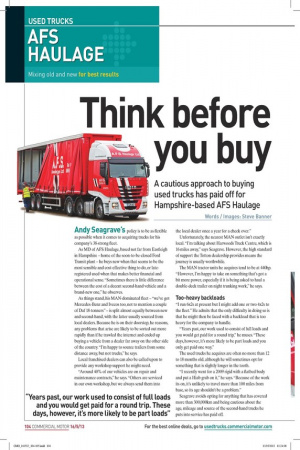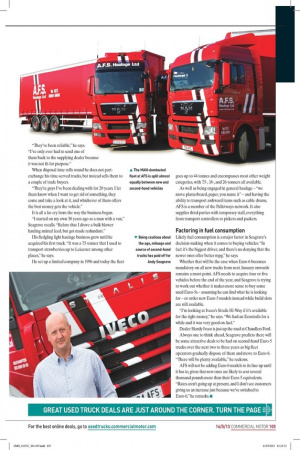Think before you buy A cautious approach to buying used
Page 39

Page 40

If you've noticed an error in this article please click here to report it so we can fix it.
trucks has paid off for Hampshire-based AFS Haulage Words! Images: Steve Banner Andy Seag rave's policy is to be as flexible as possible when it comes to acquiring trucks for his company's 38-strong fleet.
As MD of AFS Haulage, based not far from Eastleigh in Hampshire — home of the soon-to-be-closed Ford Transit plant — he buys new when that seems to be the most sensible and cost-effective thing to do, or lateregistered used when that makes better financial and operational sense. "Sometimes there is little difference between the cost of a decent second-hand vehicle and a brand-new one," he observes.
As things stand, his MAN-dominated fleet — "we've got Mercedes-Benz and Ivecos too, not to mention a couple of Daf 18-tonners" — is split almost equally between new and second-hand, with the latter usually sourced from local dealers. Because he is on their doorstep, he reasons, any problems that arise are likely to be sorted out more rapidly than if he trawled the intemet and ended up buying a vehicle from a dealer far away on the other side of the country. "I'm happy to source trailers from some distance away, but not trucks," he says.
Local franchised dealers can also be called upon to provide any workshop support he might need.
"Around 40% of our vehicles are on repair and maintenance contracts," he says. "Others are serviced in our own workshop, but we always send them into the local dealer once a year for a check over."
Unfortunately, the nearest MAN outlet isn't exactly local. "I'm talking about Harwoods Truck Centre, which is 16 miles away," says Seagrave. However, the high standard of support the Totton dealership provides means the journey is usually worthwhile.
The MAN tractor units he acquires tend to be at 440hp. "However, I'm happy to take on something that's got a bit more power, especially if it is being asked to haul a double-deck trailer on night trunking work," he says.
Too-heavy backloads "I run 6x2s at present but I might add one or two 4x2s to the fleet." He admits that the only difficulty in doing so is that he might then be faced with a backload that is too heavy for the company to handle.
"Years past, our work used to consist of full loads and you would get paid for a round trip," he muses. "These days, however, it's more likely to be part loads and you only get paid one way."
The used trucks he acquires are often no more than 12 to 18 months old, although he will sometimes opt for something that is slightly longer in the tooth.
"I recently went for a 2009 rigid with a flatbed body and put a Hiab grab on it," he says. "Because of the work its on, it's unlikely to travel more than 100 miles from base, so its age shouldn't be a problem."
Seagrave avoids opting for anything that has covered more than 300,000km and being cautious about the age, mileage and source of the second-hand trucks he puts into service has paid off. "They've been reliable," he says. "I've only ever had to send one of them back to the supplying dealer because it was not fit for purpose."
When disposal time rolls round he does not partexchange his time-served trucks, but instead sells them to a couple of trade buyers.
"They're guys I've been dealing with for 20 years. I let them know when I want to get rid of something, they come and take a look at it, and whichever of them offers the best money gets the vehicle."
It is all a far cry from the way the business began.
"I started on my own 30 years ago as a man with a van," Seagrave recalls. "Before that I drove a bulk blower hauling animal feed, but got made redundant."
His fledgling light haulage business grew until he acquired his first truck. "It was a 7.5-tonner that I used to transport strawberries up to Leicester among other places," he says.
He set up a limited company in 1996 and today the fleet goes up to 44 tonnes and encompasses most other weight categories, with 7.5-, 18-, and 26-tonners all available.
As well as being engaged in general haulage — "we move plasterboard, paper, you name it" — and having the ability to transport awkward items such as cable drums, AFS is a member of the Palletways network. It also supplies third parties with temporary staff everything from transport controllers to pickers and packers.
Factoring in fuel consumption Likely fuel consumption is a major factor in Seagrave's decision-making when it comes to buying vehicles. "In fact it's the biggest driver, and there's no denying that the newer ones offer better mpg," he says.
Whether that will be the case when Euro-6 becomes mandatory on all new trucks from next January onwards remains a moot point. AFS needs to acquire four or five vehicles before the end of the year, and Seagrave is trying to work out whether it makes more sense to buy some used Euro-5s — assuming he can find what he is looking for — or order new Euro-5 models instead while build slots are still available.
"I'm looking at Iveco's Stralis Hi-Way if it's available for the right money," he says. "We had an Ecostralis for a while and it was very good on fuel."
Dealer Hendy Iveco is just up the road at Chandlers Ford.
Always one to think ahead, Seagrave predicts there will be some attractive deals to be had on second-hand Euro-5 trucks over the next two to three years as big fleet operators gradually dispose of them and move to Euro-6. "There will be plenty available," he reckons.
AFS will not be adding Euro-6 models to its line-up until it has to, given that new ones are likely to cost several thousand pounds more than their Euro-5 equivalents. "Rates aren't going up at present, and I don't see customers giving us an increase just because we've switched to Euro-6," he remarks. •









































